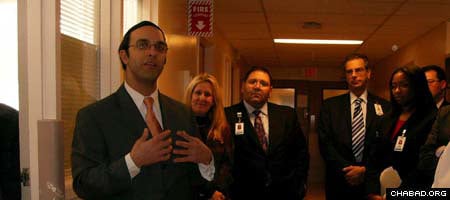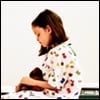A few years ago, Tovah Brill had to take her husband to the hospital on a Friday, essentially dropping all of her Shabbat preparations.
"I had a neighbor come to finish baking my challahs," recalled the Cedarhurst, N.Y., resident.
But the Brills didn't make it back to enjoy the customary Shabbat loaves. The couple spent the entire holy day in the hospital. Several weeks later, they went through the entire scenario again.
Today, Brill thanks G‑d that her husband fully recovered, but still looks back at their time in the hospital as a supreme test of will.
"I remember thinking this was just terrible as I was dozing in a chair in the emergency room with no food," said Brill, who keeps kosher. "The truth is, one becomes very worn down, cranky, and highly irritable."
That experience gave birth to a new program at Mercy Medical Center in Rockville Centre, N.Y., where Brill works as a pharmacist. She convinced the hospital last year to open up a Shabbat-friendly suite for Jewish patients' family members, complete with a kosher kitchen stocked with food.
"All of a sudden they had an entire unit – two bedrooms and a kitchenette – available," said Brill of the medical center. "They refurbished it and made it really, really beautiful."
Together with Chabad-Lubavitch of the Five Towns, Brill supervises the suite, which is also open during the week. She said that the hospital has taken up the burden of maintaining and cleaning the unit.
"They keep the place so clean," she remarked. "All I'll have to really clean for Passover is the kitchenette."
She added that the Catholic hospital has gone above and beyond the call of duty. When someone donated $100 to the medical center for the upkeep of the rooms, the hospital could have kept the donation, said Brill. Instead, a staff member called her and said, "Let's buy a new garbage can for the suite."
"They have really been very accommodating," said Brill.
A Suite at a World-Class Heart Center

Both of the suites at Mercy and S. Francis include two bedrooms decorated with linens that Brill chose herself, as well as a bathroom, kitchenette and Jewish library. The kitchenette offers two microwaves – one marked for meat use and one for dairy, in keeping with Jewish dietary law – as well as cabinets stocked with non-perishables and a refrigerator. A variety of instant meals, from stuffed cabbage to spaghetti and meatballs, are on hand as well.
The walls are lined with Chasidic pictures and guests can find hand-washing bowls next to their beds for their convenience. The libraries – donated by Devorah and Yechezkel Taitz –include prayer books for Shabbat and holiday use, Hebrew Bibles, the Tanya and other works on Jewish thought, and local Jewish newspapers.
"So much thought and planning went into making sure that Shabbat guests would be as comfortable – and made to feel as welcome – as possible," said one visitor who stayed for Shabbat when her husband had emergency surgery at Mercy on a Friday night.
Rabbi Zalman Wolowik, the co-director of Chabad-Lubavitch of the Five Towns who visits the hospitals and provides his number for visitors and patients to call at any time recounted how one woman used the suite to increase in her Jewish observance.
"She lit Shabbat candles and made herself Kiddush for the first time in her life," said Wolowik. "And she ate kosher food.
"It's an unbelievable thing," he added.
Always Open
While the suites were originally intended for use on Shabbat, staff, patients and visitors are welcome to stop by during the week for a break or to use the library.
One time, Wolowik walked in to find seven doctors praying during their break. After that, somebody from his community bought a pair of tefillin and a tallis for each suite.
According to Brill, each suite costs about $6,000 with an additional $1,500 for a yearly supply of food. She said she hopes to keep adding suites in the area.
"It's a relatively cheap thing to do and hospitals want the business," said Brill. "I want to get others to open suites all over the country."
Meanwhile, the thank you letters from satisfied visitors keep coming in.
One visitor, who stayed in the suite when his wife had open heart surgery on a Friday, wrote to Brill: "I have no words to express my gratitude to you all for your wonderful work."








Start a Discussion